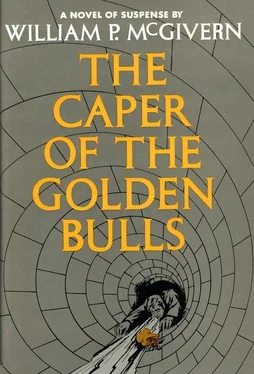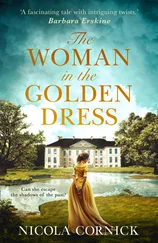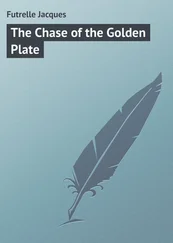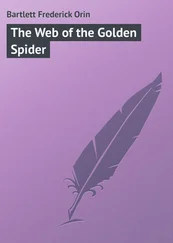“I’ll also need a sixteen millimetre projector and screen.”
“I’ll attend to everything.”
“You’re very kind.”
“It’s a pleasure, senior Since you love San Fermin as I do, we must be compadres.”
“I was only here once and I did love it. But that was long ago.”
“Never mind. The pictures will bring it all back. And time stands still for those with passion.”
“Thank you. That’s a comforting thought. Will you send the things up to my room, please?”
“I’ll take care of everything, senior.”
“Thank you so much.”
The clerk beamed after Peter: it was a pleasure to serve a gentleman, a compadre. Such a rare pleasure.
Ten minutes later Peter sat across a desk from an officer of the Banco de Bilbao.
“I don’t much like the idea of opening an account in Spain, Senor Galache. You never know what can happen. It’s like South America. But I’ve got to. Tell me: You got a statement of your current financial position?”
“But of course, Mr. Clay.”
“Okay.” Peter accepted a booklet, put it away in his pocket without looking at it. “Now, you got any banking facilities in the Far East?”
“Yes. In Hong Kong. May I ask the nature of your business, Mr. Clay?”
“Heavy equipment. Earth movers, cranes, bulldozers, that sort of thing. Your vault’s from Samsons in London, I see. It’s the old Model X-fifty, I suppose.”
“No, it’s rather more modern. It’s the X-one hundred.”
“Yeah? Well, I’ll look at your statement. If it’s all right, I’ll be back after lunch.”
“Are you staying in Pamplona for the Fiesta of San Fermin?”
“No.”
“That’s a pity. It’s very colourful. Since you’re right here, why not wait over till next week?”
“Next week? Hell, I’ll be in Calcutta then.”
The Spaniard thought: I don’t care where you will be, Mr. Clay. Leave your American dollars but take your American manners far away.
“In that case, may I wish you a pleasant trip?”
“Sure. So long.”
Peter disliked the role he had played; it made him quite gloomy, in fact. That it had been necessary hardly made it more agreeable. Peter had forced the pleasant young Spaniard to concentrate on his bad manners, so that he wouldn’t wonder at his questions about the number and model of the bank vaults. Clever, oh yes, he thought. But he didn’t enjoy behaving like that. He sighed and wondered if he had become too sensitive for this sort of work.
For the next few hours Peter strolled leisurely about the town, deliberately absorbing its texture and atmosphere. This seemingly aimless tour was essential to his preparations, and he knew from experience it wouldn’t pay to hurry it; time was precious, but so was information about which way the streets ran, and where the policemen stood at given hours, and when the crowds would be thickest in the squares and market places.
He liked the old Basque stronghold. He liked its yellow buildings and stone fortifications, its avenues and monuments, and the briskly sturdy look of its people. He found the street of the Thousand-Broken-Heads where Ignatius of Loyola had received the wound that turned his steps and reflections to sainthood, and he carefully measured and studied the Calle de la Estafeta, through which the foolhardy and courageous of all ages would run before the encierros of bulls each morning during the fiesta of San Fermin.
Peter stopped for a glass of beer at one of the cafés that ringed the Plazz de Castillo. The great square was now quiet and orderly but next week it would be the joyously thumping heart of the fiesta; thronged with dancers, musicians, merrymakers; trembling with the explosions of rockets and fireworks; all the cafés mobbed, every table sprouting thick clusters of bottles and glasses and saucers.
After a bit Peter left some coins for the waiter and went back to his hotel.
At the wheel of a grey Citroen parked in the Plaza de Castillo, a man in a black raincoat looked after Peter with a frown that delicately rearranged the pattern of scars on his forehead. Seated beside him was a short stocky man with silvery white hair and features so hard and seasoned that they might have been hacked from a block of mahogany.
The man in the black raincoat said, “I don’t understand it, sir. He’s drifting about like a tourist.”
“Not quite, Phillip. Tourists shop for things. Postcards, souvenirs, and so forth. Not Mr. Churchman. He is looking at things. And looking very carefully.”
“I see. That didn’t occur to me, Colonel.”
“Well, I was paid to notice such things, and you weren’t, Phillip.”
“Yes, Colonel.”
“Please, Phillip. That’s all over.”
“It’s difficult, sir. It’s a strong habit, sir.”
“Would it help if I made it a direct order?”
“Yes, I’m sure it would, Colonel.”
“Do not address me by rank again, Sergeant Lemoins. That is an order.”
“Very well, sir.”
The colonel glanced at his watch. “We must talk to Mr. Churchman soon. But first I suggest we have our lunch. Did you like the place called The Four Crowns?”
“Very much, sir.”
“Then let’s go there, Phillip.”
“Yes, Colonel.”
Peter spent much of that afternoon in his darkened hotel room studying films taken the previous year during the fiesta of San Fermin. He watched daredevils in the Calle de las Estefeta fleeing before fighting bulls; saw amateur toreros ca ping bony and frantic young oxen in the Plaza de Toros; followed snake-lines of exuberant dancers looping and curling through the crowds in the Plaza de Castillo.
Something else caught his eye and he quickly stopped the action on the screen.
High above the crowds in the Plaza de Castillo floated gigantic heads, their mouths stretched wide in fiercely cheerful smiles.
Peter studied them intently, while a tantalisingly amorphous idea began to take shape in his mind. He remembered those huge, gaily painted heads from his first visit to Pamplona. And what else? Did time really stand still for those with passion? He remembered the bulls and the fireworks and the men dancing in the street, the bad news on the radio and the goatskins of wine raised high through all the reeling night, the funny, unpronounceable names of the towns in Poland, and a sudden wistful knowledge that passion and excitement died with the loss of innocence.
He was oddly disturbed by his memories. Very well, he thought sadly, let the innocent weep for such things; sinners know the value of peace and a bottle of good wine.
He made himself concentrate on the heads. They were called Cabezudas, he remembered, or Gigantes. Peter stood abruptly, as if physical activity might be a specific against his strange gloom, and measured the heads immobilised on the screen. As nearly as he could judge by using the human figures in the scene as a scale the eyes of the Cabezudas were ten or twelve feet above the ground, and their foreheads were about three feet wide. The heads were constructed, it appeared, of lacquered cloth or leather stretched around wooden frames. The men who supported them were concealed by flowing robes which dropped from the shoulders of the Cabezudas. Eyeholes cut in the cloth allowed the men to guide themselves safely through the streets. For several minutes Peter stared at the silent screen, a frown shadowing his eyes.
He was wondering how much strength and stamina one would require to carry a Cabezuda about the city for an hour or so... At last he rose and made himself a drink. Gripped by mounting excitement, he paced the floor and stared at the grinning heads frozen on the screen. An idea flickered and danced about the dark corners of his mind like a will-o’-the-wisp. It was so audacious that his first impulse was to put it straight from his mind, to fling it away as he would a ticking bomb.
Читать дальше












